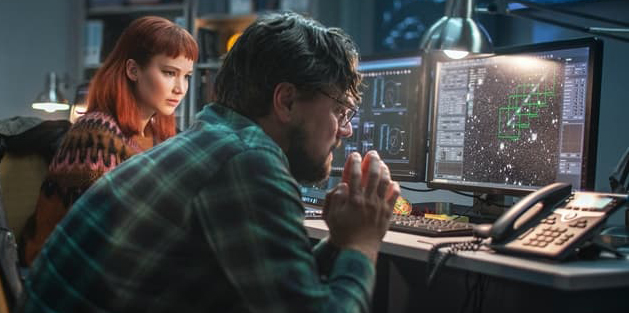Don’t Look Up
and the Impotence of Today’s Political Satire
(An essay by John Burke, January 15, 2022)
***
There’s an odd phrase that comes from a religious context that states one shouldn’t preach to the choir. Historically, organizations like the Roman Catholic Church took that premise to the ridiculous extreme. To follow the Judaeo-Christian edict of ‘go forth and multiply’, missionaries were sent around the globe to convert (forcefully if necessary) ignorant heretics into God-fearing Christians, causing wide-spread genocide not just in Europe but in almost every country it infected. It was for their own good, the church claimed, and for the good of their soul.
It’s unlikely the recent release of Netflix’s Don’t Look Up (wr. Adam McKay and David Siroya/dir. Adam McKay) will cause as many casualties as the Catholic Church, but it has been accused of being little more than preaching to the choir. The filmmakers have made no bones about the fact this film is a allegory for inaction on climate change. As such, it is unlikely to convert too many to the cause. In movie terms, it’s far too ‘on the nose’. All that may be so, but that might have been exactly the thing Adam McKay and Netflix were counting on. With climate inaction now in its sixth decade, and despite the fires, floods and general chaos caused by a warming climate, it feels like little progress is being made. There is a temptation to just say ‘fuck it’ and start building infrastructure to deal with the coming catastrophe, or even abandoning some cities completely. With frustration in the ranks at an all-time high, perhaps the choir needs a sermon for no other reason than to boost their moral. To see their message presented in an entertaining way might be just what’s needed, if nothing else than to remind them how foolish the other side of the argument might be.
With frustration in the ranks at an all-time high, perhaps the choir needs a sermon for no other reason than to boost their moral.
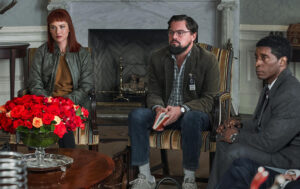
Netflix claims Don’t Look Up is one of the most successful feature projects they have ever produced. But since it wasn’t released in theatres for a full box office run, we are forced to take their word for how many people watched. Apparently somebody did, but Netflix isn’t willing to admit exactly who. The humour in Don’t Look Up was supposed to be relevant to the people who are concerned about the climate crisis, but those are the ones who are least likely to find it in any way funny. And the people who might actually find this funny would never accept the premise. This makes the intended audience a little difficult to pin down. Regardless of the demographic of who actually watched the film, anyone who isn’t already convinced would never have such a title at the top of their recommended viewing list within the Netflix algorithm.
The portrayal of wilful ignorance of politicians toward science surprises no one.
If there was anything learned from the tenure of Trump it is the ineffectual influence of political satire. When Trump announced his candidacy, comedian John Oliver practically begged Trump to run, thinking it would be comedy gold. Let’s just say it didn’t work out that way. (1) The portrayal of wilful ignorance of politicians toward science surprises no one. Any thought that such flippant material would actually prevent someone like Donald Trump from gaining public office is delusional. And much like the reaction to Trump running for president, Don’t Look Up becomes less and less funny as it goes along.
***
Climate disasters have been a staple of Hollywood since long before scientist sounded the alarm on climate change in the 1970s. The predictions of climate disaster in movies like Soylent Green (wr. Stanley R. Greenberg/dir. Richard Fleisher) and Bladerunner (wr. Hampton Fancher/dir. Ridley Scott) seemed far from being a certainty back then. Such cautionary tales were never seriously considered real predictions of what might come, mostly because it was thought, even by climate scientists, there would be plenty of time to do something about it. (2)

It’s hard to imagine the frustration of the scientists who first rang the alarm bells back then. Their plight falls into a broad trope that’s become so entrenched in Hollywood it would be difficult to imagine American cinema without it. It’s called the Cassandra complex. Cassandra was, of course, the mythical figure who was granted the ability to know the future but condemned to have no one believe her. The Cassandra complex gets even more play in Hollywood films these days, where the rejected genius is scoffed at until everyone is finally forced to face the truth. The list of movies using this device is long and varied, easily defining an entire category of cinema. With Hollywood’s penchant for happy endings, there is often a last minute twist where the Cassandra figure convinces the right person and becomes the hero of the story. When done right, like in Twelve Monkeys (wr. David and Janet Peoples/dir. Terry Gilliam), it can be very effective. In Don’t Look Up, the filmmakers try to have fun with the concept, but to uneven effect.
***
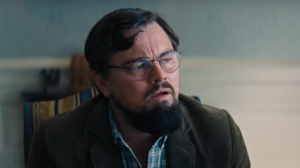
In Don’t Look Up, Cassandra comes in the form of Dr. Randall Mindy (played by Leonardo DiCaprio) and his student, Kate Dibiasky (played by Jennifer Lawrence). The dynamic between these two characters seems interesting in the beginning, a washed up professor and his brilliant student. (3) As Dibiasky’s doctoral thesis advisor, Dr. Mindy has most of the power in the relationship, but he is willing to give credit where it is due. But he is a man after all, and therefore vulnerable to the temptation to steal her thunder. This relationship held a lot of promise if their common earnestness and fear had been played against the buffoons they encounter as they try to convince the world of the danger. Unfortunately, that dynamic got lost after only the first act.
Perhaps DiCaprio pulls off the frumpy part a little too well, making the transformation a little difficult to accept.
Dr. Mindy, and perhaps DiCaprio himself, seemed to easily fall for the premise that he could play the ‘world’s sexiest scientist’ after being transformed from an inarticulate frump. This is achieved, in a very Clarke Kent sort of way, by just trimming his beard and combing his hair. Perhaps DiCaprio pulls off the frumpy part a little too well, making the transformation a little difficult to accept. Let’s face it, DiCaprio in his late forties isn’t the sex symbol he was in his twenties after Titanic (wr./dir. James Cameron).

It’s too bad the writers even required him to make that transformation. His character started out as the intellectual anchor of the movie. But all that was lost when he was seduced, literally and figuratively, by the media in the form of morning news co-anchor Brie Evantee (played with quirky conviction by Kate Blanchett).
Kate Dibiasky (played by Jennifer Lawrence) is a doctoral candidate studying distant galaxies when she stumbles onto a much closer object of interest, a planet-killing comet. Ms. Lawrence appeared to lose the thread of this character a few times. She bounced back and forth between inarticulate and shrill, when I think she was supposed to be brilliant and frustrated. The character was an enigma to be sure. Was she supposed to be smarter than Dr. Mindy? Were they intellectual equals? And what’s with the strange haircut? Was she a rebel or did she just not care how she looked? Or was she a nerd who didn’t know any better? Or maybe she was suffering from trichotemnomania? Whatever the case, the character was a bit hard to pin down.
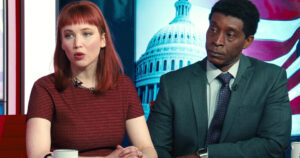
Possibly the most interesting and underused character was Dr. Teddy Oglethorpe, head of NASA’s Planetary Defense Coordination Office. (4) Rob Morgan as Dr. Oglethorpe was inspired casting, but his understated character and wry sense of the absurd unfortunately got lost in the over-the-top chaos surrounding him. There’s an impression his best bits got cut down in an effort to shorten the already over-long movie, much to the film’s detriment. It would have been fun to see more of his weariness and impatience dealing with politicians and the media.
Unfortunately, in this case they sometimes come across as an endless parade of smug, self-righteous, liberal jerk-offs.
The cast the filmmakers were able to attract for this project is hard to believe. The desire for celebrities to want to participate in a film that allegedly professes their values is understandable. Unfortunately, in this case they sometimes come across as an endless parade of smug, self-righteous, liberal jerk-offs. It would be pointless to list them all, but it would be an interesting exercise to see how a viewer’s age corresponded to the number of cameos they recognized. (5)
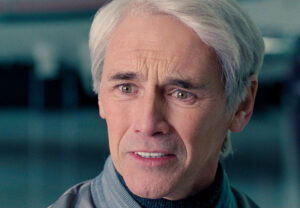
As usual, Mark Rylance, the king of eccentric performances, stands out from this list, playing Peter Isherwell, the ego-maniacal cell phone billionaire who feels his alleged genius in business somehow transfers equally into every scientific field in which he dabbles. Rylance easily personifies the psychopathy of all those tech billionaires whose success dragged them out of their parent’s basements and into the public eye. His very strange dental work alone should get some kind of recognition. (6) It was fun to see Isherwell decline into psychosis and denial when his simplistic short-sightedness failed to solve all the world’s problems. The scene where he ran away after he failed to stop the comet was the most satisfying point in this rather pointless movie.
But what British comedians understand is that such material must be delivered with deadpan earnest, as if the character firmly believes it.
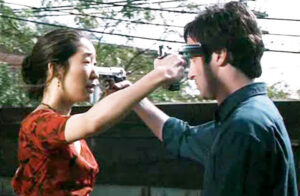
It’s inevitable that Don’t Look Up would be compared to other end-of-the-world comedies like Hitchhiker’s Guide to the Galaxy (wr. Karey Kirkpatrick and Douglas Adams/dir. Garth Jennings) (7) and Dr. Strangelove: Or How I learned to Stop Worrying and Love the Bomb (wr. Stanley Kubrick, Peter George and Terry Southern/dir Stanley Kubrick) and maybe even unintended comedies like 2012 (wr. Harald Klosser and Roland Emmerich/dir. Roland Emmerich) and Armageddon (wr. Jonathan Hensleigh, J.J. Abrams, et.al./dir. Michael Bay). There were even shades of the more reflective moments in Last Night (wr./dir. Don McKeller) starring Don McKellar and Sandra Oh along with a stellar Canadian cast.

The humour plays much like the obstinate denial of reality that would fit well in a Douglas Adams story, or for that matter a sketch from Monty Python’s Flying Circus (cr. John Cleese, Eric Idle, Graham Chapman, Michael Palin, Terry Gilliam and Terry Jones). But what British comedians understand is that such material must be delivered with deadpan earnest, as if the character firmly believes it. Unfortunately, the cast of Don’t Look Now offered the occasional wink at the audience, as if to say, “Isn’t this clever?” Some of the actors (like DiCaprio and Morgan) got it, others not so much. This had the effect of occasionally pulling the audience out of their suspension of disbelief. Don’t get me wrong, there were some inspired funny bits, hidden like candy inside this fruitcake of a movie. Kate’s obsession with Lieutenant General Stuart Themes (played by undisguised glee by Paul Guilfoyle), who charged them for the free snacks at the White House. It was well worth the three (or was it four) call backs. Subtly usually gets trodden on with movies like this, so it was nice to see some of it survived.
You can almost feel the pauses where some of the characters wait for the laughs to die down
It’s just too bad this sermon to the converted wasn’t a bit more concise, especially in the first 90 minutes, where the same joke was endlessly repeated until it began to feel a little thin and condescending. They couldn’t resist ‘pumping it up’ to make the jokes work ‘better’, as if the filmmakers wanted every joke to have its own laugh. Distorting the film’s narrative in this way made the audience lose the thread of the story on occasion. You can almost feel the pauses where some of the characters wait for the laughs to die down or the cheers for a favourite character’s catch phrase. The script by Adam McKay (based on a story by David Siroya) reads well enough, but almost has the feel of an episode of a popular sitcom you’ve never seen.
The first act promised a slow progression into the ridiculous. In the beginning, the (somewhat) realistic reaction to the discovery was interesting, where the filmmakers convincingly displayed how such news of the end of the world would have to be absorbed on a personal level before the characters would be concerned about warning others. But by the 2nd act they had jarringly progressed from the first meeting at the White House to the main characters being booked on a frivolous morning chat show. It wasn’t that such a scene wouldn’t have been appropriate later on, but to that point, the satire hadn’t escalated far enough to justify the jarring leap. These characters hadn’t been sucked far enough into the void to agree to make such an announcement in that forum. It betrayed the intelligence of the characters and the audience.
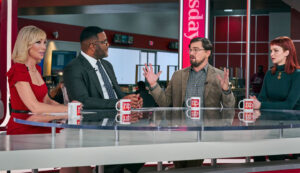 Another jarring example is the sudden transition from the scientific realm to Dibiasky working as a cashier in a convenience store. Maybe a bit more back story might have prepared the audience for this transition. And there was no indication why Dr. Mindy was so easily convinced by Peter Isherwell’s bogus plan to exploit the asteroid for profit. Neither Dibiasky’s poverty nor Dr. Mindy’s gullibility had been established before this. These sudden jumps felt like the editor (the always competent Hank Corwin) was a bit hamstrung by the producers or the director. There was no indication that the release of the film was so pressing that he couldn’t have smoothed out some of these jumps. These tonal shocks would have made more sense if they had built up to some sort of climax, but it seemed there was no pattern to it. It wasn’t until the ‘don’t look up’ political campaign near the end of Act 2 that the story finally got back on track again.
Another jarring example is the sudden transition from the scientific realm to Dibiasky working as a cashier in a convenience store. Maybe a bit more back story might have prepared the audience for this transition. And there was no indication why Dr. Mindy was so easily convinced by Peter Isherwell’s bogus plan to exploit the asteroid for profit. Neither Dibiasky’s poverty nor Dr. Mindy’s gullibility had been established before this. These sudden jumps felt like the editor (the always competent Hank Corwin) was a bit hamstrung by the producers or the director. There was no indication that the release of the film was so pressing that he couldn’t have smoothed out some of these jumps. These tonal shocks would have made more sense if they had built up to some sort of climax, but it seemed there was no pattern to it. It wasn’t until the ‘don’t look up’ political campaign near the end of Act 2 that the story finally got back on track again.
If you knew the world was going to end, would you really drag your ass into work the next day?
In the final act, the filmmakers went all in on another disaster movie trope, the fantasy that the United States government and the military industrial complex could react swiftly to any crisis. Even in such a broad comic premise like this, it was hard to accept that, in the space of less than six months, the United States, on its own, created a replacement for the Space Shuttle, a dozen extra-orbital nuclear missile platforms, and an interstellar space craft. All this during a time when a significant portion of the population of the planet believe they were all going to die when the comet crashes into the earth. (8) If you knew the world was going to end, would you really drag your ass into work the next day? And if you did, would your boss? And what would he pay you with? Bits of green paper? And would anybody accept that paper if they knew a comet was going to crash on their head?
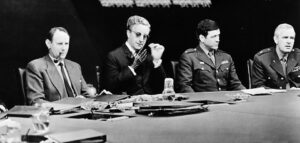 But logic isn’t the point in a story like this, which is too bad since it would have made the message and the satire more convincing in the end. What made Dr. Strangelove so funny was that the whole thing seemed all too possible. But the filmmakers felt it was necessary to cross from satire to farce, something that only served to dislodge the film from the reality from which it had begun. They didn’t trust their own premise, and it went a bit off the rails. It’s too bad since all the elements were here for a really fun 110 minute movie, jammed into a rather lack-lustre 138 minute movie. If their aim was a farce, the film could have used a bit of the Zucker brothers touch, where films like Airplane (wr./dir. Jim Abrahams and David and Jerry Zucker) used a scatter-gun approach to jokes and cameos just to keep the tempo going. They didn’t care if you got all the jokes the first time around. They knew that if they made you laugh, there was good chance you’d come back and watch it again.
But logic isn’t the point in a story like this, which is too bad since it would have made the message and the satire more convincing in the end. What made Dr. Strangelove so funny was that the whole thing seemed all too possible. But the filmmakers felt it was necessary to cross from satire to farce, something that only served to dislodge the film from the reality from which it had begun. They didn’t trust their own premise, and it went a bit off the rails. It’s too bad since all the elements were here for a really fun 110 minute movie, jammed into a rather lack-lustre 138 minute movie. If their aim was a farce, the film could have used a bit of the Zucker brothers touch, where films like Airplane (wr./dir. Jim Abrahams and David and Jerry Zucker) used a scatter-gun approach to jokes and cameos just to keep the tempo going. They didn’t care if you got all the jokes the first time around. They knew that if they made you laugh, there was good chance you’d come back and watch it again.
Why has no one used the considerable creativity of Hollywood to offer solutions that don’t require legally complicated admissions of neglect or malice.
Preaching to the choir only has limited use. It’s too bad Don’t Look Up didn’t even try to speak to some of the more conservative hard-liners. It’s a near certainty that Don’t Look Up will never gain traction among the ultra conservatives obstructing progress on climate change.
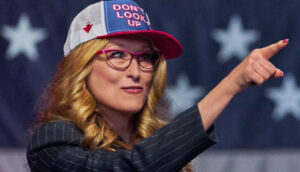
In fact, they are more likely to watch Meryl Streep’s performance as President Orlean and see her as a female version of Donald Trump, something desirable rather than the reprehensible character she is portraying. (9)
The limited impact of Don’t Look Up begs the question why no one has thought to use the considerable creativity of Hollywood to offer solutions that don’t require legally complicated admissions of neglect or malice. Why is it so difficult to create a conservative think-piece that would allow such a message to slip through. Perhaps something less accusatory and more constructive? Maybe featuring a Conservative hero who finds a solution to climate change? How hard could it be really? After all, these humourless people are not that hard to fool. They play Springsteen’s Born in the USA as if it was a patriotic anthem rather than the anti-government protest song it really is. Donald Trump himself tried to use Neil Young’s Rockin’ in the Free World at his rallies in the same way, completely ignorant of what the lyrics actually say.
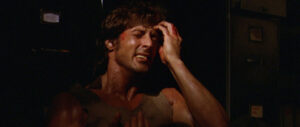
The thing is, if you can slip your anti-war message into a Rambo movie, like was done in First Blood (wr. Michael Kozoll, William Sackheim and Sylvester Stallone/dir. Ted Kotcheff), then it can be done again. (10) In First Blood John Rambo was actually an anti-war figure, a mentally damaged war criminal trying to adapt to life during peacetime, and yet the conservatives cheered him on.
Maybe the right approach for Don’t Look Up should have been to take a page from the playbook of comedian and Late Night host Steven Colbert. There were many conservatives who initially thought Colbert’s blow-hard character from the Colbert Report (cr. Stephen Colbert, Ben Karlin, and John Stewart) was for real, at least until they realized they were actually the butt of his jokes.
Maybe what we need is someone who can reach out a hand to these people and show them there is a way to work against the forces destroying their lives without having to sacrifice their individualism and their pride.
You would never know it by the rhetoric, but there is a lot of common ground on both sides of this argument. Fires, floods and hurricanes don’t discriminate by political leanings. In fact, the poorer conservatives living in rural areas of America are impacted the most by climate change. Maybe what we need is someone who can reach out a hand to these people and show them there is a way to work against the forces destroying their lives without having to sacrifice their individualism and their pride. Maybe, just maybe, they might be forced to think about exactly what they are advocating for when they elect people who fight against their best interests. I keep waiting for such a character to appear, either in a film or in American politics, a character that both sides might actually listen to. Because if no one is listening, then there’s no point in talking.
***
1) To his credit, comedian Bill Maher didn’t find it nearly as funny, instead seriously pointing out the very real danger of this notorious rule-breaker actually becoming president. His concern turned out to be prescient, with Maher even predicting the attempted overthrow during the transfer of power. His prediction that Trump would use the office for his personal gain was also spot-on, though easily foreseeable.
2) Most of the scientific consensus back then was that the climate catastrophe was more than 100 years away.
3) Thank God the filmmakers didn’t make them lovers. That would have been one trope too far.
4) And yes, as they said in the movie, that is a real thing.
5) I still have no idea who Arianna Grande or Kid Cudi might be.
6) The same can be said for Kate Blanchett, with her impressive dental work and wide eyes that could have given even Marie Osmond a fright.
7) I swear I spotted a whale and a bowl of petunias floating in orbit after the comet hit the Earth.
8) In the movie 2012, director Roland Emmerich found an ingenious solution to this: cheap Chinese slave labour. Needless to say, none of these labourers ended up on the ship at the end of that movie.
9) Ironically, something that might have helped Streep create this character was that she actually played Margret Thatcher in the movie The Iron Lady (wr. Abi Morgan/dir. Phylida Lloyd), where a reactionary character not far off from Trump was elected to lead the country despite her disastrous policies and questionable character.
10) Not so for the second installment, Rambo: First Blood, Part 2 (wr. Sylvester Stallone and James Cameron/dir. George Cosmatos) where Rambo is given a second chance to re-prosecute the Vietnam War. The writing was genuinely awful in this movie, even for a Rambo film. My favourite howler had to be Stallone asking his former commander “Do we get to win this time?” Very few conservatives talk about the first movie now, where the portrayal of the character could not have been more different than the popular perception of John Rambo. Not many are too fond of the mentally damaged Rambo crying on the shoulder of his former commanding officer at the end of First Blood. They definitely prefer the ‘killing gooks’ Rambo.
***
Don’t Look Up (2021)
Running Time: 138 minutes.
Released by: Netflix, December 8, 2021
Direction by: Adam McKay
Written by: Adam McKay and David Siroya
Cinematography: Linus Sandgren
Starring: Leonardo DiCaprio, Jennifer Lawrence, Meryl Streep and Kate Blanchett
594 total views, 2 views today

